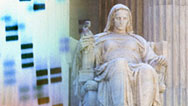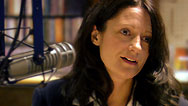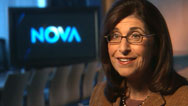Judging Intelligent Design
- By David Levin
- Posted 11.01.07
- NOVA
U.S. District Court Judge John E. Jones III presided over the landmark case of Kitzmiller v. Dover. It was one of the most significant battles in the cultural war over teaching evolution in U.S. public schools. Here, Judge Jones describes what it was like to take part in the case, why he ruled that intelligent design does not qualify as a science, and more.
 Listen
Listen
Does intelligent design qualify as science? Not according to Judge John Jones, who ruled in the landmark Dover case.
Transcript
Judging Intelligent Design
Posted: November 1, 2007
DAVID LEVIN: You're listening to a NOVA podcast. I'm David Levin.
In the fall of 2004, in the small town of Dover, Pennsylvania, the school board ordered biology teachers to read a controversial new statement to students. It cast doubt on Darwin's theory of evolution and offered another idea, called intelligent design, as an alternative. To some, it seemed like a small matter, but Dover's policy triggered an historic court case—an intense legal battle over First Amendment rights, the teaching of evolution and even the nature of science itself.
Judge John Jones presided over the case. He talked to us about the experience from his office in Harrisburg, Pennsylvania.
Let's start back at the beginning of the trial. What was your reaction when you first heard about this case?
JUDGE JONES: The day that the suit was filed in December of 2004, I was on my commute home, from the courthouse in Harrisburg, Pennsylvania, and I tuned in to a local radio station, and they said that there had been a huge press conference in the state capitol rotunda with attorneys for the plaintiffs, and they announced that they had filed, that morning, a major lawsuit involving a First Amendment challenge to this policy by the Dover area school district. And I distinctly recall that I had two thoughts.
One was that they talked about intelligent design, and I couldn't really remember, having heard of intelligent design before—pretty funny now in retrospect. And the other thing that I remember distinctly is that I thought, I wonder who's going to get that case.
DAVID LEVIN: So was it clear from the start that both sides were totally polarized? Or was there any way they would have settled out of court?
JUDGE JONES: My intention was, if I saw, you know, a little bit of daylight, I was going to call the lawyers into chambers and see if I could talk to them about resolving the case. Wasn't there a way that maybe the policy could be modified or could be taken down, and everybody could have some satisfaction? And I recall looking at the lawyers, and their very body language and serious demeanors indicated to me that they were entirely polarized, and that there was no point in taking them into chambers, and the case wouldn't—would not settle. And I think it was at that moment that it was clear that they wanted to go to war.
NARRATOR: Throughout the trial, you had to take a look at whether or not intelligent design was actually science. Did you ever think that was something you'd have to decide as a judge?
JUDGE JONES: Well I, I, there's a, there's a sort of seminal question that, that's been asked, in different quarters since I decided the case, and that question is, "what is a judge doing deciding what is science, and what isn't science?" And we do that every day at the trial court level and particularly at the federal bench.
Science is essential to a lot of the determinations that we make, and we're guided by certain touchstones. For example, is it generally accepted in the scientific community? Is it peer reviewed? Has it been published? Has it withstood scrutiny by, by scientists, generally?
I mean, these are some of the touchstones that we use, and that's really what I did as I evaluated intelligent design, and if you look at intelligent design, it is not generally accepted—it's not accepted anywhere, by the leading lights of the scientific community. The works of its proponents have not been peer reviewed. It hasn't been widely published. It's been deeply criticized as not being science.
DAVID LEVIN: With that in mind, were you surprised at the number of people in Dover that wanted intelligent design in schools?
JUDGE JONES: Few things surprise me. I mean, I'm not unfamiliar with the fact that, that there are a great number of people, more than a few in the United States, who are Biblical literalists and who, you know, believe, in things like intelligent design or that, the Earth, for example, is six thousand years old and absolutely do not believe in the theory of evolution.
As we speak, you know, there's a creation museum that opened, I guess earlier this year in Kentucky, and I understand they're getting a huge attendance, so no, I mean I'm not, I'm not blind to the fact that there are some folks who harbor what for them are very earnest and deep-seated beliefs. I guess what was remarkable to me is that they were able to get this through a school board.
DAVID LEVIN: Do you see more legal battles down the line about the teaching of evolution in the US, or is that something you think could ever be resolved?
JUDGE JONES: You know, I don't think it'll ever be resolved. If by resolved you mean that the controversy will evaporate, no, it'll never happen. I'm 52, and it's not going to happen in my lifetime. Some people, because of their beliefs and because of sort of the basic tenets of evolutionary theory, cannot, will not, accept those principles, under any set of circumstances, and, you know, they persist in that view despite abundant science that shows in so many cases that the things that they believe in are not correct, such as the age of the Earth, for example.
I did find during the trial, interestingly enough, that the foreign press, by and large, found it very odd that this controversy still existed in America 80 years after the Scopes trial had concluded. In some other industrialized nations, I think the press in those countries did question why in this most magnificent country, this most industrialized of all free countries we would burn up a lot of time and energy, you know, deciding whether or not we should teach something that, at the end of the day I thought was creationism, alongside evolution. I think they found that astonishing.
DAVID LEVIN: There's been so much heated debate over this topic in the US, and people are so passionate and emotional about it on both sides. What do you think was really at stake in this trial?
JUDGE JONES: Well, I mean, intelligent design was characterized by one of the witnesses as a science stopper, and, you know, we're in a world where we're trying to cure various cancers, we're trying to stop pandemics, you know, we're, we're, we're, there's a myriad of different ways that science is being utilized, and we're going to teach kids that when they get to something that looks designed and looks complex they should just stop their inquiry and accept that some, a designer rendered it. I mean, I, I frankly think that that's absurd, so it's a vindication for good science.
DAVID LEVIN: Though people on the intelligent design side do claim that science is just another kind of dogma, you know, that we're putting blind faith in evolution.
JUDGE JONES: Well, you know, Darwin didn't want to find this stuff out. I mean, the, the evidence led him to this conclusion, and he was so alarmed at it that he put it away for years. You know, he didn't reach a conclusion and then try to find evidence to justify the conclusion. He went where the evidence led him. And was very circumspect about it.
DAVID LEVIN: Sounds sort of like a courtroom.
JUDGE JONES: Yeah, exactly, you follow the evidence where it leads, and that's what he did. Intelligent design does it backwards. Intelligent design assumes first that there's a designer, and then they walk back from that. See, they reach the conclusion first, and then they, then they're constantly trying to find areas that justify that belief. You know, I think in part that's wishful thinking.
So I used to think that if Thomas Jefferson walked through the back of the courtroom some day, he'd say, oh my God, you know, you must be kidding me, that you're going to try to teach this to ninth grade students. You know, the framers were and the founders were like Renaissance men. They loved science. You look at Benjamin Franklin and the rest of them, you know, to jerk this into a science curriculum, they'd think that was absurd. So I hope that I did what the framers would have wanted under the circumstances.
DAVID LEVIN: Well Judge Jones, thanks very much for speaking with us.
JUDGE JONES: It was a pleasure.
Credits
Audio Credits
- Produced by
- David Levin
- Interview by
- Richard Maurer and David Levin
- "Judgment Day: Intelligent Design on Trial" is produced by
- NOVA and Vulcan Productions, in association with The Big Table Film Company.
Image Credits
- (Judge Jones)
- © Ian Bradshaw Photography
Related Links
-

Intelligent Design on Trial
Science is "Exhibit A" in a landmark trial on the teaching of evolution.
-

Caught in a Culture War
In a conflict about the teaching of evolution, journalist Laurie Lebo found herself at odds with her own family.
-

The Judge Speaks
Hear Judge John Jones read key excerpts from a landmark court case on the teaching of evolution.
-

Why NOVA Covered the Case
In this short video, NOVA's Paula Apsell explains the reasons for making “Intelligent Design on Trial.”
You need the Flash Player plug-in to view this content.

